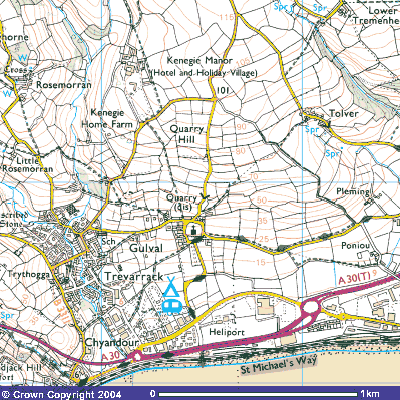
Image produced from the Ordnance Survey Get-a-map service.
Image reproduced with kind permission of Ordnance Survey and Ordnance Survey of Northern Ireland.
Like many families, the Corin family has a tradition of descent from remote antiquity. Much of this tradition can be found in a letter by Anne Powne Gully written in the mid-nineteenth centry.
The legendary origins of the Corins stem from the story of Corynaeus or Corineus, one of the Trojan remnant who accompanied Aeneas on his wanderings (Aeneid, Books 9 and 12). A short time after this, Corynaeus accompanied Brute (Brutus, son of Sylvius and great-grandson of Aeneas) after he had had the misfortune to kill his father, when he gathered together the remaining Trojans and came to Albion, founding the British race.
Albion was then uninhabited apart from a few giants, of whom Gogmagog was the chief. Corineus, who was of gigantic stature, wrestled with Gogmagog, and threw him over the cliffs into the sea. Cornwall was assigned to him as a reward. Corineus is said to have built a defensive wall between his territory and the rest of Albion, and the area became known as Corin's Wall, or Cornwall.
The statues in London's Guildhall, called Gog and Magog, represent Gogmagog and Corineus. The originals were twice destroyed - in the Great Fire and in 1941.
Brute founded Troynovant, or London, and begat a line of British kings, including Bladud, Gorboduc, Ferrex and Porrex, Cymbeline, Cole, Vortigern and Arthur. The Cornish chough on the Coryn arms is said to be symbolic of King Arthur, commemorating the family's legendary connections. Spenser mentions that Corin had a son, called Madan.
This legend appears in the works of Geoffrey of Monmouth, Layamon, Johannes de Altavilla ("Architrenius"), Spenser ("The Faerie Queene" II.x, III.iii, III.x) and Drayton. Holinshead treated the stories as fact when writing his Chronicle of English History.
The names Corin and Corinne also occur in Languedoc and Aquitaine, though they probably derive from the Greek korinos, a maiden. The Breton conteurs who passed on the names were bearers of an age-old tradition.
It has also been suggested that the name Cornwall is a corruption of New Corinth. There may be some distant recollection of a migration of Celts from Greece and the Near East (Galatia) to Cornwall. Certainly the names of some Cornish families are of great antiquity.
In Domesday, Cornwall is spelt Corinuelle, reminding one of Spenser's line: "Corin Cornwall called to his immortal fame." It has also been suggested that there is a connection with Cirencester, which the Romans named Corinium.
In the 16th, 17th and 18th centuries, the most notable branch of the family spelt the name CORYN, and others imitated this. But the name has also been spelt in a variety of other ways, including CORIN, CORON, COREN, CORING, CARRON, CORRIN, CORIEN, and perhaps COROM, CORYINE and even GORAM. These may well be attempts at the phonetic rendering of a name that at one time was pronounced with the stress on the second syllable. The name, however, is possibly spelt CORNE in some parishes, and the likelihood of the millrind and choughs on the Coryn of Kenwyn arms (as on Hugh Curwen's arms) being a pun on 'corn' and 'Cornwall' suggests perhaps a monosyllabic pronunciation.
P.H. Reaney's Dictionary of British Surnames suggests that the surname is 'a contraction of MacOran, from MacOdhrain, son of Odhran, the pale-faced, from Irish-Celtic Odar'. There are, however, Corrins on the Isle of Man, to whom this etymology is more applicable. Other suggested derivations have been the Welsh coren, meaning a dwarf; the place names Gerrans and Gorran (both named after saints, and hence possibly a patronymic); and the Cornish cor-yn meaning in a corner-place.
The sixteenth century Archbishop of Dublin, Hugh Curwen, spelt his name Coren, and his arms are similar to the Kenwyn family's arms, and have no similarity with the Curwen arms. Curwen is derived from Colwen, now Colvend, in Dumfries-shire.
The tax returns and Protestation Returns extant for the Penwith Hundred for 1662 (the Hearth Tax) and 1641 do not mention any Corins there (unless GAMAN at Gulval is a mistranscription of Carran). There were Corins in Bodmin, Kenwyn, St Gerrans and St Just in Roseland, St Ewe, St Stephen in Brannel, and possibly Devonshire as well at the beginning of the seventeenth century. All these branches had left their native parishes by the late eighteenth century. The Corins who survive all seem to descend from a common ancestor in Gulval in the mid-seventeenth century.

This page was last modified on 29 May 2004 by Hector Davie.
Please mail me about any errors, or if you have any comments!